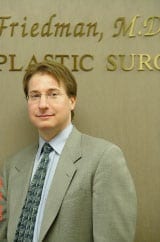Posted July 02, 2018 in
Perhaps the reality shows need a reality check.
By Ronald M. Friedman, M.D. Spring, 2008
 It’s in my best interests to keep it a secret. But I feel a nagging obligation to come clean: plastic surgery is real surgery, which means real pain, real bruising, and real scars. To make matters worse, occasionally patients aren’t happy with the results.
It’s in my best interests to keep it a secret. But I feel a nagging obligation to come clean: plastic surgery is real surgery, which means real pain, real bruising, and real scars. To make matters worse, occasionally patients aren’t happy with the results.
Prospective cosmetic surgery patients often ask me, “Doctor, what do I need to have done?” My answer is always the same: “Nothing.” No one really needs cosmetic surgery, though millions of people benefit from it annually. Although 25 year-olds routinely undergo mini-facelifts and browlifts on “The Swan,” I have never done (and probably never will do) these procedures on such young patients. There is a calculated risk/benefit ratio in performing cosmetic surgery, and a good surgeon should always be cautious–even if his patients are not.
Another frequently asked question is “Isn’t this a minor surgery?” Unfortunately, there is no such thing as minor surgery—except on other people. If you are the one undergoing surgery, it’s always major. As such, there will invariably be postoperative pain, inconvenience, and time away from work. Of course, patients always look and feel great when they greet their families on “Extreme Makeovers.” But remember: that’s six weeks after surgery. If most of us spent six weeks away from the stress of work and raising kids while enjoying a luxury hotel, a professional trainer, a personal chef, and wardrobe and make-up consultants, we would probably look and feel great too. Even without the plastic surgery.
I have another shocking revelation: any time the skin is cut, there will be a scar. Although most scars are fine line and well-concealed, occasionally they are unattractive. The scars are usually a worthwhile trade-off for the improvement in appearance, but—like it or not—there is a trade-off involved.
Among my favorite questions: “Have you ever had a dissatisfied patient?” If a plastic surgeon tells you that all of his patients are happy, he’s either A. inexperienced, B. lying, or C. both. The good news is that about 95% of patients undergoing cosmetic surgery are happy with the results. Unfortunately, that means that 5% are not. Sometimes it’s because their results are disappointing. Sometimes it’s because their expectations were unrealistic. Although every cosmetic surgeon has benefited from the buzz created by “reality” television, these shows have disingenuously created the impression that plastic surgery can jump start your social life by making you look like Brad or Angelina (courtesy of “I Want a Famous Face”). Reality check: if you don’t look like a movie star before surgery, you probably won’t afterward.
Unlike the reality shows, I generally advise people against extreme surgery. “Extreme” is a term that should be limited to sporting events, political views, and nachos. The simple reality is that most people want to look better, not different. Unless you are in the federal witness protection program, you probably still want to be recognizable to your family and friends after surgery. Moreover, extreme surgery often entails increased pain, expense, recovery time, and risk. If the current trend toward single-session head-to-toe surgery continues, it will inevitably spawn programs like “Extreme Lawsuits.” Remember: operative changes are permanent. You can always do more, but it’s difficult to take back what’s already been done.
Given all these trade-offs and drawbacks, why do I continue to perform cosmetic surgery? Because it is rewarding to watch a woman become more self-confident after breast enlargement, a man become less self-conscious after nasal reshaping, and a shy little girl finally show her personality after correcting her protruding ears.
Although my social life is decidedly less exciting than those depicted on “Nip/Tuck,” I am proud to be a plastic surgeon. But I recognize that “Extreme Makeovers” and “The Swan” represent televised plastic surgery fantasies. I live in the real world, a world where I am humbled by my inability to eliminate postoperative pain, scarring, risks, and the occasional dissatisfied patient. My advice to those seeking plastic surgery: take your time finding a surgeon you trust; have realistic expectations; and never do anything too extreme.